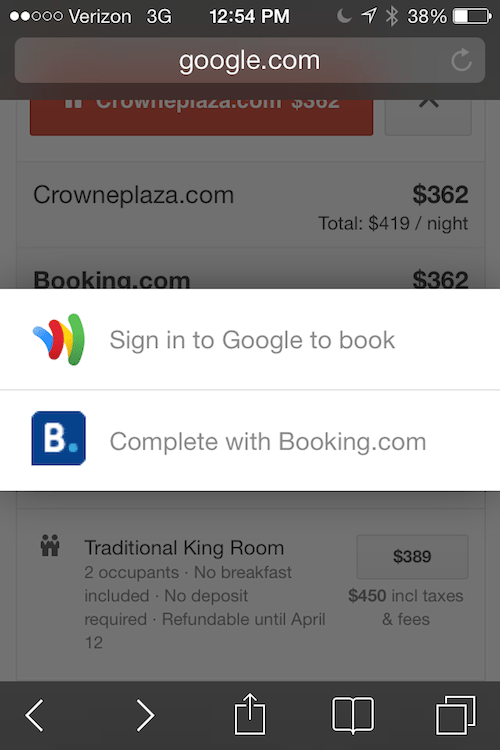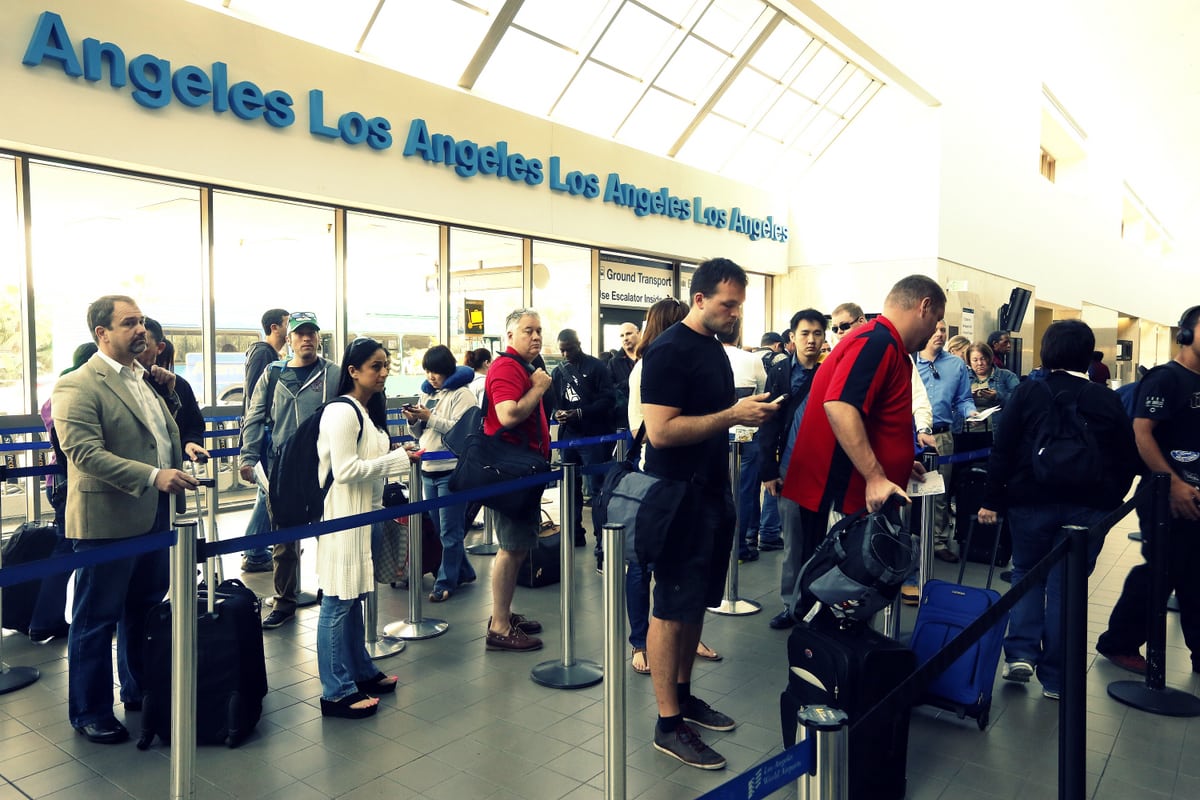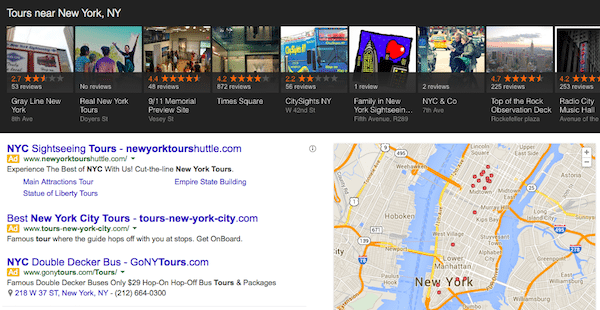Skift Take
Will Google be the comeback kid in travel after under-whelming the competition over the last couple of years? Google is slowly -- very slowly -- getting its act together as it tries to get its figurative hand in virtually everything.
From Google Hotel Finder to Google Flight Search, Maps and Tour Finder, the search engine giant’s far-flung travel offerings have come under the spotlight anew this week with Room 77’s announcement that Google has licensed its hotel metasearch technology and hired a bunch of Room 77’s engineers.
There are varying opinions about the import of the deal, which may be less about technology, and more of a talent grab.
“This deal was the first round in a typical Silicon Valley ‘soft landing’ for Room 77 and an acquihire for Google,” argues Max Rayner, a partner at Hudson Crossing. “Room 77 was finding it hard to get enough traction at the same time that Google came to realize that the hospitality ecosystem is complex enough that actual domain knowledge is needed.”
While Google declines to provide any details other than confirming the Room 77 agreement, Rayner, formerly senior vice president of product engineering at Travelclick and CTO at Travelzoo, opines that the technology licensing story is for the most part a ruse.
“The licensing bit is just a fig leaf so that any new development by the team that Google’s adding to its own would not be subject to attack for intellectual property infringement by any future owner of Room 77,” Rayner says. “This was especially key for Google since Room 77 will now try to engineer the second round of its soft landing by trying to sell the brand and its Checkmate technology to another buyer.”
Regardless of how Google ultimately will use Room 77 technology or content, including its Room Views, and its displays of special hotel rates for military personnel and seniors, this is by far not the most important thing going on at Google Travel.
What’s Google Been Up To?
Since acquiring ITA Software for $700 million as the foundation for Google Flight Search and launching Google Hotel Finder in 2011, apart from its make-or-break advertising business, Google’s impact on the travel industry in terms of its own travel products has been for the most part a big yawn.
The products are speedy, chock full of information about onboard meals and power outlets, illustrated by tons of photos, and rounded out by user reviews, ratings and maps, but they are disparate and disconnected, and they have by all accounts failed to move the proverbial needle.
Much to the surprise of some, Google Travel hasn’t killed Kayak, Expedia, TripAdvisor or anyone else.
Google is doing a ton of experimentation in travel, but as Robert Cole of RockCheetah points out, “Google has zero interest in being an online travel agency.”

But Google is quietly extending its reach throughout the travel cycle, turning itself into the ultimate aggregator and one-stop shop.
Just take a look at Google Hotel Finder on mobile (at right), and you’ll see that travelers have the choice of booking rooms from Booking.com through Google Wallet or navigating to Booking.com’s website. Google Hotel Finder offers the same Google Wallet booking option for Priceline.com and Carlson Rezidor Hotel Group, for example.
Google is thus involving itself in the transaction for advertising purposes, and this is by no means limited to the travel vertical.
“Google wants to extend its reach across the travel lifecycle,” says Douglas Quinby, vice president, research, at PhoCusWright.
Google Wallet, Quinby says, “is an example of Google moving down the funnel.”
But if Google doesn’t want to be another Expedia, Priceline or Orbitz, then what’s the point?
Transactions But Not For Transactions’ Sake
The point is that Google Wallet and Google’s travel features are a means for upping its revenue in its core advertising business because the data Google collects transcends traveler intent and now involves actual transactions.
“Even if the identities are not explicitly revealed to potential advertisers, instead of an advertiser saying, ‘give me young hip guys that might like to stay at the W,’ they can say ‘I will pay you five times that for people who actually stayed at the Conrad because I want to do counter-programming and entice them to try W,” says Rayner of Hudson Crossing.
And Google is quietly starting to connect the dots across its properties.
Google Maps features Waze traffic reports and tours and activities information, and Google Flight Search now has a link to Google Hotel Finder, and vice versa.
The time may not be far off when Google takes the not-very-radical step of offering travelers a hotel room after they complete a flight booking. And, of course, when travelers arrive at the destination, they might break out their Android device and use Google Carousel to scope out an attraction.
Hotel consultant Cole is in the camp of those who feel that the Room 77 licensing deal may be more than window dressing, and that Google may use Room 77 technology to better attract hotel supply with parallels to TripAdvisor’s TripConnect, and also for personalization.
“For personalization, being able to aggregate content from multiple sources, but resolve it specifically for a room category and compare prices for king bed, ocean view, and concierge-level rooms is pretty nice — especially if you are eligible for a senior, auto club, frequent guest, and maybe all of the above, or other discounted rate,” Cole says.
Someday Google could potentially get it all together in travel if it has the focus to execute efficiently.
That will be a challenge, according to PhoCusWright’s Quinby, although it is certainly doable.
“A lot of these products — Field Trip, Tour Planner, a lot of their local and mobile services, which have so much relevance to travel — are managed by different groups,” Quinby says. “And they may not even fall under ‘travel’ per se.” A prime example of this? Google Maps, the most popular travel app on every smartphone.
While Google’s lack of overwhelming traction in travel has been a disappointment to date, it is methodically expanding its reach, and it is equipped with a luxury — lots of time — that the vast majority of competitors just can’t afford.
The Daily Newsletter
Our daily coverage of the global travel industry. Written by editors and analysts from across Skift’s brands.
Have a confidential tip for Skift? Get in touch
Tags: google, hotels, maps, room 77, tours
Photo credit: Google wants to know not only what travelers are searching for, but also, through Google Wallet, what they are actually buying as the company extends its reach in the travel industry. Pictured, travelers standing in line at the LAX International Airport in Los Angeles on April 22, 2013. . Damian Dovarganes / Associated Press

